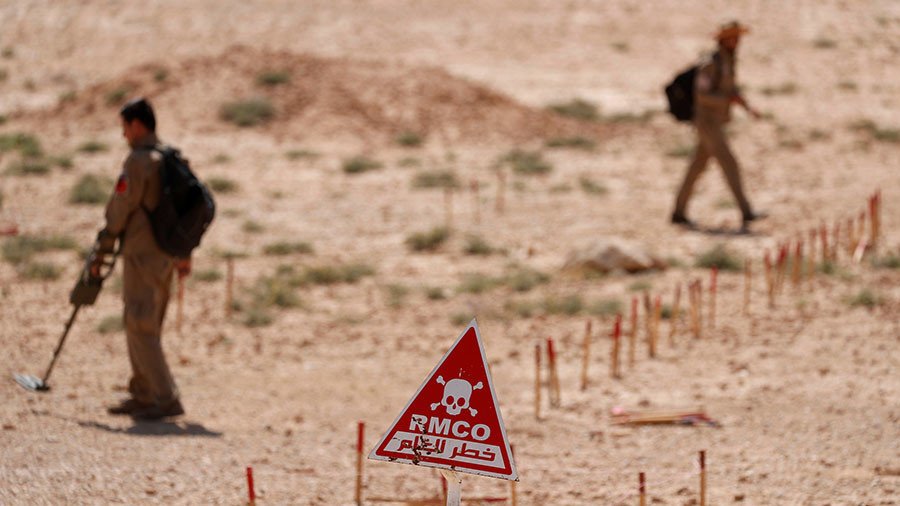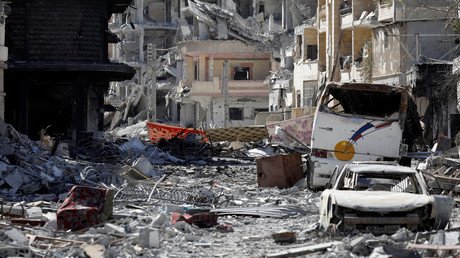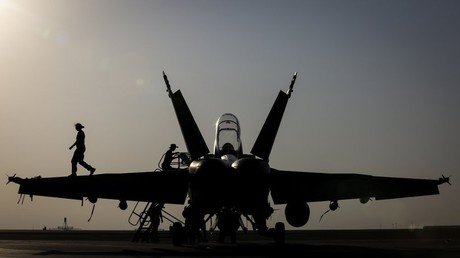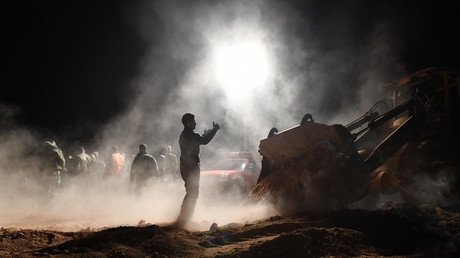‘Children pick up things that explode in their hands’ – HRW calls for Raqqa de-mining efforts

Raqqa residents are desperate for more support from the US-led anti-Islamic State coalition for de-mining efforts as hundreds of people have already been killed, says HRW’s Nadim Houry.
Hundreds of civilians, including over 150 children, have been killed by homemade landmines in Syria’s Raqqa since its liberation from Islamic State (IS, formerly ISIS) by the US-backed Syrian Democratic Forces, according to Human Rights Watch (HRW).
“ISIS had planted the antipersonnel mines when it controlled the city. They include devices often called booby traps or improvised explosive devices (IEDs). Most appeared to be victim-activated and therefore banned under international law,” the organization said in a statement.
Global leaders rushed to claim credit for Raqqa victory. But where is their support today to deal with aftermath? from the landmines left behind by ISIS to the shocking destruction, Raqqa local leaders and civilians left with little supporthttps://t.co/mBghoPphSwpic.twitter.com/2ff0QeAKhP
— Nadim Houry (@nadimhoury) February 12, 2018
HRW has called for international support in clearing the rubble and de-mining Raqqa. It also highlighted the growing risk of more civilians being killed as people return to the devastated city.
Nadim Houry told RT he visited Raqqa in January 2018 and spoke with local authorities, residents and medical organizations working there who told him that their top concern are the landmines and other remnants of war that are still in the city since it has been retaken from IS.
“While there have been some de-mining efforts either directly by the de-mining organizations funded by the international coalition or through training,” this is not sufficient compared to the need, he said. The local residents are desperate for more support for the demining efforts, he added.
Houry says that the international coalition against IS – which includes the US and many other countries – needs to provide more support for Raqqa: “more demining equipment, more funding and an increase in the number of de-miners and an increase in the training of local residents doing the de-mining.”
He pointed out that while there is some support and there is some training that has taken place, “that just doesn’t reach the level needed.”
To illustrate the situation, Houry referred to an example of what he saw in Raqqa: “residents are very desperate to go and check on their homes. And because of the high risk and because of the few working opportunities for many young men, you can go to a couple of roundabouts in the city and for about $50 a day, you can hire people to go and clear your house from debris and any potential remnants of war. This is at a time when they are not trained to do this, this is very dangerous.”
The Raqqa Civilian Council, which is in charge of the city, issued a directive in late November asking people not to return to their homes before they had been cleared of mines, the HRW representative said.
“But in practice some people are returning because they don’t want to stay in camps or be displaced. Others are not necessarily returning to move in but they are returning to check in on their homes… and that is why are still seeing the high rate of casualties,” he explained.
There needs to be more awareness raising about the risks, according to Houry.
“I saw some posters on roads and even some graffiti on buildings ‘Danger,’ ‘Mines,’ ‘Don’t enter.’ But there needs to be more awareness raising, particularly with children who sometimes pick up things that explode in their hands,” he said.
“Secondly, there needs to be more de-mining efforts… We saw this in most cities that were retaken from ISIS. ISIS unfortunately always leaves behind a lot of landmines, anti-personnel landmines that continue to kill and wound people. And we need to see stronger international commitment to demining efforts,” Houry said.
According to Houry, the problem with the mines is affecting all the other efforts: “it is very hard to remove rubble, if you don’t know if you have mines under rubble. It is very hard to go and fix water pipes before you demine.”















